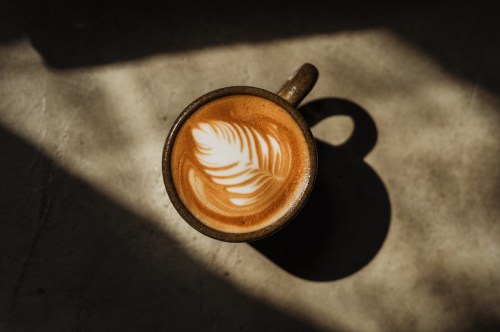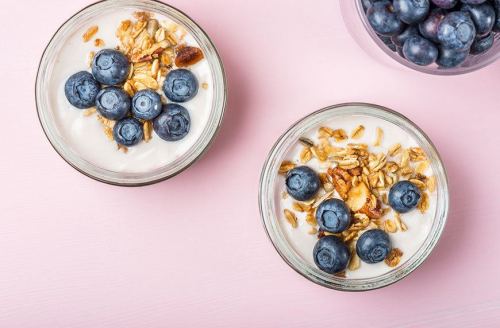Our editors independently select these products. Making a purchase through our links may earn Well+Good a commission
I like to think there are two kinds of coffee drinkers in this world: The ones that chug a cup of cold brew in one fell swoop, and the ones that sip on the same latte for hours on end (me!) throughout the day. If you fall into the latter category, you may want to listen up. (Also, pro tip: Remember to brush first.)
Experts in This Article
dentist &
cosmetic dentist
cosmetic and general dentist
general dentist in Carlsbad, California and the founder of Oral Genome
According to this recent TikTok video by @dr.m_, dentist Suhail Mohiuddin, DDS, shares a key (and highly concerning) cause of cavities: sipping on coffee for several hours. He explains that if your mouth has a pH level of less than 5.5 (meaning it’s more acidic), drinking coffee can demineralize or dissolve the protective layer of enamel on your teeth.
To get to the *root* cause of the problem, we called upon four dental experts to share their expertise on the subject—and whether or not we need to adjust (read: speed up) our coffee-drinking routine for the sake of our chompers.
Is drinking coffee slowly bad for your teeth?
Let’s just get to it: We spoke with four dental experts, and they all (sadly) agree that sipping on coffee slowly, i.e. for several hours at a time, is not great for your pearly whites. Of course, this definitely doesn’t mean you should go cold turkey. (Let’s be realistic.) Instead, the simple modifications of how you drink your brew ahead will be your magic trick(s) for healthier teeth.
Why drinking coffee for a prolonged period is unhealthy for your teeth
First things first. “Sipping your coffee for hours can be worse for your teeth than drinking it quickly because the sugars and acids in the coffee can stay in your mouth for a longer period of time, increasing the risk of tooth decay as the sugar and acids in coffee can erode tooth enamel,” says Michael Wei, DDS, a New York City-based cosmetic dentist. Conversely, he notes that drinking coffee quickly will naturally limit exposure to these elements, potentially reducing the risk of tooth decay.
“Sipping your coffee for hours can be worse for your teeth than drinking it quickly because the sugars and acids in the coffee can stay in your mouth for a longer period of time, increasing the risk of tooth decay as the sugar and acids in coffee can erode tooth enamel.” —Michael Wei, DDS
Tina Saw, DDS, a Carlsbad, California-based dentist and founder of Oral Genome, also notes that coffee can lead to tooth discoloration due to the tannins found in the beverage. “Coffee is known to cause tooth staining due to its dark color and presence of tannins,” she says. This is the same reason red wine is prone to causing discoloration.
And according to Richard M. Lipari, DDS, a Westchester, New York-based dentist, coffee isn’t the only ingredient you need to be mindful of when drinking your morning brew. “Most people drink their coffee with milk, sugar, and/or syrups, and these can lead to cavities, too,” Dr. Lipari says. That said, there are ways to drink coffee more responsibly for the sake of your teeth.
How to keep coffee from dinging your dental health
Brush before you brew—and sip water as you go
“Before drinking coffee, I recommend that my coffee-drinking patients brush their teeth. Next, rinse with water—or chew sugar-free gum—to help remove any remaining coffee particles from your teeth. Try to drink plenty of water while drinking coffee to help wash away any residual coffee on your teeth and to help keep them hydrated, and limit your intake of sugary or processed coffee drinks, as these can cause cavities,” Dr. Wei says.
If your stomach can handle it, try to get to the bottom of your glass within 10 minutes
According to Dr. Wei, the sweet spot of drinking a cup of coffee is between five and 10 minutes. “This allows you to savor the flavor and enjoy the relaxing effects of the caffeine without it becoming too bitter or overwhelming,” he says. However, it’s important to remember that drinking coffee too quickly can irritate your stomach. Thus, it’s important to do what’s best for you and consult with a medical professional to determine the best route to take for your health concerns.
Cut the amount of sugar you stir into your coffee
“Especially if you drink your coffee with sugary add-ins or pumps of syrup, you should be mindful not to sip on your coffee throughout the day. You want to minimize the amount of time that sugar is in contact with the teeth, too” Dr. Lipari says.
Give your mouth a rinse afterwards, and only brush after taking a beat
“Saliva plays a vital role in neutralizing acid and protecting teeth against dental issues. Drinking coffee quickly or rinsing your mouth with water after coffee consumption can help stimulate saliva production, which can help wash away coffee residue and reduce the potential negative impact on your teeth,” Dr. Saw says. She also notes that maintaining a good oral hygiene routine is a must, which “includes regular brushing, flossing, and rinsing with mouthwash.”
When drinking coffee, Dr. Saw also recommends brushing your teeth 15 to 30 minutes after finishing a cup of joe or washing it down with water to reduce acidity in the mouth. “I’d also recommend drinking it during the duration of your work commute or breakfast, because I always finish my coffee within 30 minutes instead of being tempted to sip it all day,” she says.
Dapple in whitening products, if you so wish
“The acid in coffee can erode enamel over time, and as such, it can be very harmful to your teeth in the long run. In terms of staining, consider trying SmileDirectClub’s Stain Barrier to prevent stains, which protects your teeth with an invisible shield against staining beverages like coffee,” says Jeffrey Sulitzer, DMD, a dentist and the chief clinical officer at SmileDirectClub. Additionally, he recommends trying an electric toothbrush and water flosser for brushing your teeth, like SmileDirectClub’s Electric Toothbrush and Space Saver Countertop Flosser.
Learn how to give your coffee an extra boost for optima energy in the morning:
Sign Up for Our Daily Newsletter
Get all the latest in wellness, trends, food, fitness, beauty, and more delivered right to your inbox.
Got it, you've been added to our email list.










